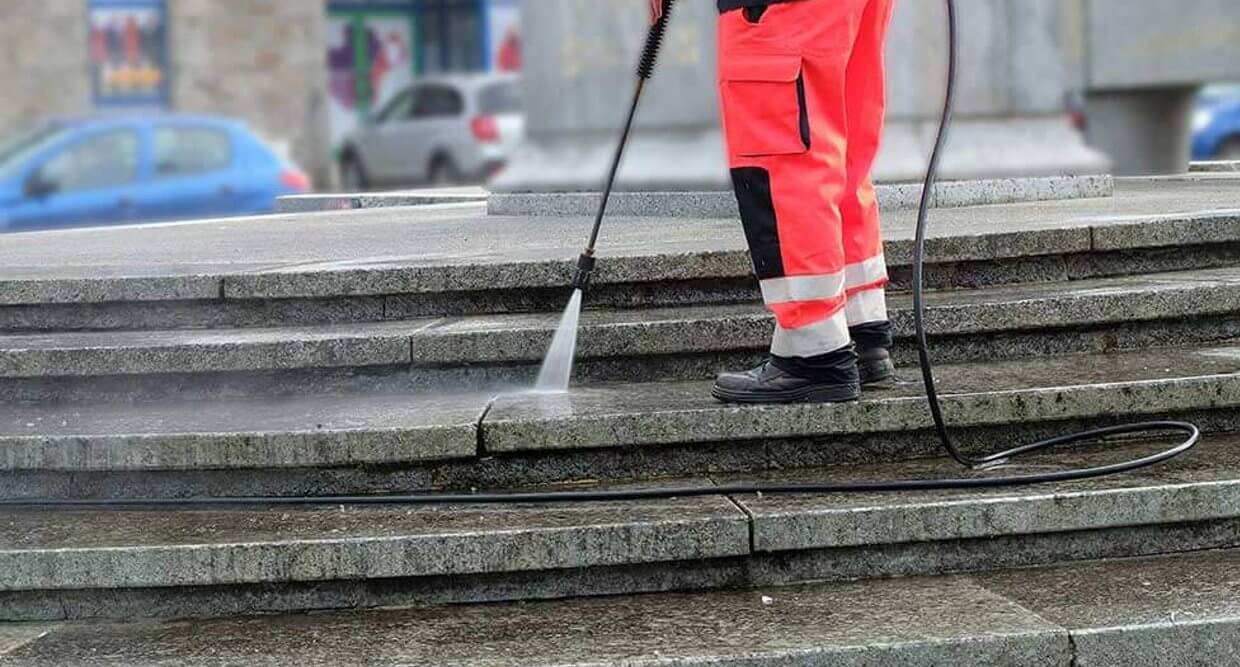Blog
Cold Water vs. Hot Water Pressure Washer: Which one is better?

If you’re in the market for a new pressure washer for your business, you’re probably wondering whether you should choose a hot or cold-water unit. But the answer to which one is best depends on how you’ll be using it. Both hot and cold-water pressure washers have their strengths, so keep reading to find out which one is better suited to your needs.
Hot water pressure washers
Hot water pressure washers are powerful cleaning tools that use heated water to tackle stubborn substances like oil and grease. A burner powered by electricity or gasoline heats the water to a temperature of more than 90 C (200 F). The hot water is then pressurized before spraying it onto surfaces. The combination of heat, pressure and specialized detergents effectively breaks down and dissolves tough grime.
An electric– or gasoline-powered hot water pressure washer is excellent for achieving a sterile clean, making them indispensable in industries where cleanliness and hygiene are paramount. Best uses of a hot water pressure washer include:
- Removing grease and oil stains in automotive garages and service centres
- Sterilizing surfaces in healthcare facilities and food processing plants
- Cleaning heavy machinery and equipment in manufacturing and construction sites
Cold water pressure washers
Cold water pressure washers, on the other hand, rely solely on the force of cold water propelled at high pressure to remove dirt, grime and debris. They’re straightforward to operate and are commonly used for general cleaning purposes. Cold water pressure washers are suitable for applications where hot water is unnecessary, making them versatile and cost-effective options for a wide range of cleaning tasks. Best uses of a cold-water pressure washer include:
- Cleaning large exterior surfaces like driveways, sidewalks and building exteriors
- Removing dirt and algae from fencing, decks and patios
- Routine maintenance in agriculture, transportation and waste management
Differences between hot and cold pressure washers
The primary difference between hot and cold pressure washers is the use of hot water in the former and cold water in the latter. Hot water washers excel at breaking down greasy and oily substances, while cold water washers are more suited for general cleaning tasks. The choice between them depends on the specific cleaning needs and the type of substances you need to remove.
Industrial usage of a hot or cold-water pressure washer
Pressure washers are useful in various industrial sectors, thanks to their versatility and efficiency. Industries that benefit from pressure washers include construction, manufacturing and oil, gas and mining, where heavy machinery often requires thorough cleaning. In agriculture, pressure washers are essential tools for cleaning farm equipment and facilities. Transportation companies rely on these machines to maintain vehicles and fleets. Waste management and marine industries also depend on pressure washers for sanitation and maintenance tasks.
To optimize the industrial usage of a pressure washer, various parts and accessories are available, allowing customization and adaptation to specific needs. An electric pressure washer is preferred for indoor and light-duty tasks, while a gasoline pressure washer provides more power for outdoor and heavy-duty cleaning.
Can you use hot water in a cold-water pressure washer?
One can run warm water through a cold-water pressure washer safely up to 150 F (65 C). You cannot run hot water, especially at extremely high temperatures, through your cold-water unit. You could potentially melt the seals in the pump and overheat the unit. All that said, your hot water tank likely wouldn’t be able to keep up with the demand for very long.
Is hot water better than cold for cleaning?
It depends on what you’re cleaning. Cold water is recommended for high-volume low-pressure applications to knock away caked-on mud and debris or when stripping away paint. For all other applications, hot water will allow for faster cleaning and reduce the amount of detergent required. Hot water pressure washers are especially recommended when cleaning grease and oil.
If you’re in the agriculture, transportation or construction industry and you need a pressure washer to blast away caked-on mud and dirt, then cold water will do the trick. But if you’re trying to clean engine grease, or you’re in the food processing industry and you’re counting on your pressure washer to help you break down grease and fat, kill harmful bacteria and maintain rigorous health and safety standards, then you’ll need a hot water unit.
While hot water helps clean everything better than cold water does, it isn’t always necessary. If you want to learn more about which type of pressure washer is best suited to your industry, be sure to download our free guide — 9 Things You Must Know Before Buying a Pressure Washer
What’s the best hot-water pressure washer?
One of the most well-known brands in high-pressure cleaning equipment is Hotsy. Hotsy pressure washers feature rugged high-pressure pumps backed by a seven-year warranty and are built with durable reinforced frames for maximum durability and longevity. Hotsy units are built to last, which is why Hotsy is one of the most trusted names for high-pressure cleaning equipment on the continent.
What’s the best cold-water pressure washer?
If you’re looking for a cold-water pressure washer that can handle the toughest jobs you can throw at it, nothing but a Hotsy will do. Hotsy is an industry leader with more than 35 different models of cold-water units alone.
Pressure washer solutions in Western Canada and North Dakota
Contact Hotsy Water Blast for industrial equipment and custom manufacturing needs. We’re your resource for pressure washer cleaning equipment, detergents and parts and accessories with nine convenient locations. In Alberta: Edmonton, Calgary, Lethbridge, Red Deer, Grande Prairie. In British Columbia: Langley. In Saskatchewan: Regina. In North Dakota: Williston and Bismarck.
